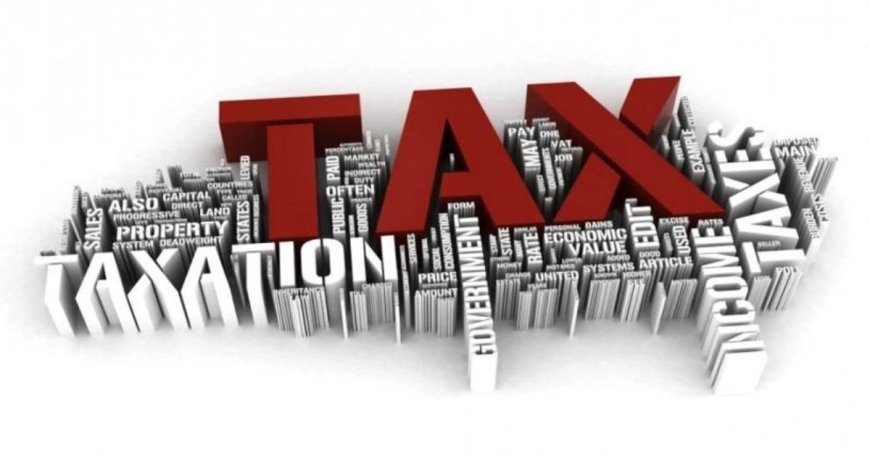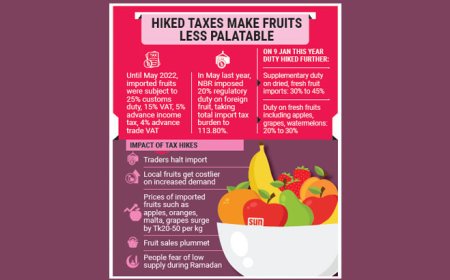FY26 Budget: Tax Burden to Increase Amid Economic Strain
Tk7.9 Trillion Budget Prioritises Revenue Growth Over Tax Cuts, Legalises Black Money Through Real Estate

Despite growing economic pressures on both citizens and businesses, the interim government is set to unveil a Tk7.9 trillion budget for the 2025-26 fiscal year (FY26) today, emphasizing increased revenue collection. While officials maintain that the focus will be on broadening tax coverage rather than hiking rates, several new fiscal measures indicate that taxpayers may feel greater financial strain.
Finance Adviser Dr. Salehuddin Ahmed will present the budget at 3 pm via Bangladesh Television and private channels. According to sources from the finance ministry and the National Board of Revenue (NBR), the budget aims to ensure macroeconomic stability, control inflation, and reform institutional sectors, though these goals may come at a cost to the public.
One controversial provision allows the legalization of undisclosed income, or "black money," through real estate purchases—a move criticized for encouraging financial opacity. Additionally, income tax rates are expected to rise in certain brackets, despite officials assuring that tax slabs will remain unchanged.
The government has set a revenue collection target of Tk5.64 trillion for FY26, up 4.25% from FY25’s Tk5.41 trillion. Of this, Tk4.99 trillion is expected from the NBR, with the remainder from non-tax and other sources.
Several changes in income tax, customs duties, and VAT policies will be introduced. Notably, the tax-free income threshold will rise slightly from Tk3.5 lakh to Tk3.75 lakh, but the minimum tax payable, which does not adjust with the threshold, will increase to Tk5,000—impacting taxpayers nationwide. Moreover, compulsory online tax filing will be introduced for individual taxpayers, including government employees and select multinational staff, marking a push toward digital compliance.
The corporate sector will see conditional incentives: the tax rate for non-listed companies may fall from 27.5% to 25%, contingent on conducting all transactions over Tk5 lakh through banking channels—promoting a cashless economy. Listed companies with over 10% free-floating shares meeting the same criteria could see rates cut from 22.5% to 20%, while those with less than 10% free float may face an increase to 25%. This widening corporate tax gap raises concerns about fairness and the tangible impact of earlier cuts, which business leaders say remain limited.
The budget also reopens a controversial "black money" amnesty, allowing undisclosed wealth to be legalized through property purchases with a higher tax but fewer registration burdens. While the NBR argues this will encourage transactions at market value, critics warn it undermines transparency and accountability.
To broaden the tax base, a 2% advance income tax (AIT) is proposed on imports of about 200 previously exempted products, including essential foods (potatoes, onions, lentils, chickpeas), garment industry inputs (cotton, man-made fibers), fertilisers, and medical equipment. This measure could generate an additional Tk2,000 crore but risks inflationary effects.
Domestic manufacturers of refrigerators, air conditioners, and mobile phones face increased VAT: air conditioners and refrigerators will see VAT rise from 7.5% to 15%, while mobile phone VAT will increase to 7.5% and 10%, depending on local value addition. These hikes come just six months after corporate tax rates doubled for these sectors, putting further pressure on local industry. Turnover tax will also increase from 0.6% to 1% for companies with annual turnover above Tk3 crore, squeezing small and mid-sized businesses.
Significant changes to baggage rules include limiting tax-free gold imports to once annually and mandatory declaration of currency exceeding \$10,000—a tightening of regulations affecting returning expatriates who benefited from prior leniency.
As a rare concession, the government may reduce newsprint import duty from 5% to 3% after appeals from the struggling newspaper sector, though the industry still bears a hefty 30% total tax burden, and promised reductions in AIT seem unlikely.
Overall, the FY26 budget signals a tough balancing act between raising revenue and managing public and business sector pressures amid challenging economic conditions.
What's Your Reaction?





















































































